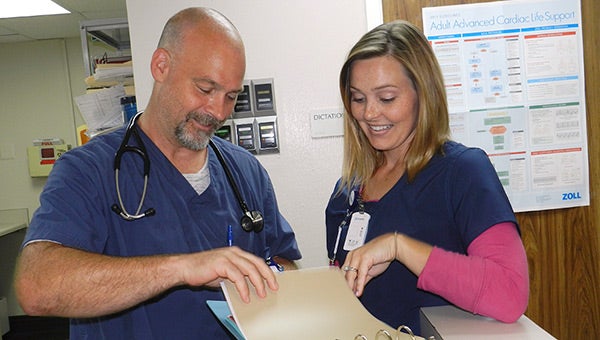Parker leads hospitalist program at AH
Published 2:48 am Wednesday, July 27, 2016
Dr. Heath Parker’s medical career has included private practice, administration, and teaching.
And the medical director for Andalusia Health’s relatively new hospitalist program says hospitalists make health care more efficient.
Hospitalists are fully certified, trained physicians who work full-time in a hospital treating patients. They can provide comprehensive and immediate care, and because they don’t also have patients waiting to see them in an office, can both spend more time with patients and react more quickly.
Andalusia Health launched its program, which includes three doctors and two nurse practitioners, in May.
“If I were doing primary care, I would go by the hospital to see patients in the morning,” he said. “But no matter how hard I might try, it would be next to impossible to get back to the hospital until that evening, because you’ve also got a waiting room full patients.
“It’s nice when you can think ‘my doctor is taking care of me in the hospital.’ Some still do and are great at it. But no matter how hard they try, can’t do as good a job or reacting as quickly as a hospitalist can.”
Doctors who admit patients to Andalusia Health can choose to use the hospitalist service or not.
“Not all of the primary care doctors are going to sign on to (hospitalist care). It’s up to them,” Dr. Parker said. “But we are also taking care of patients that come into hospital without a local primary care doctor. Some doctors don’t use the service, but it is available if they need to take a vacation or have other special situations.”
“We’re not here to stop on anyone’s toes,” he said. “But we are here if they need us.”
As with anything in life, Dr. Parker said, communication is the key.
Primary care physicians share records with the hospitalists and we send our records back to them when a patient discharges.”
While the hospitalist program is relatively new in the Andalusia area, the concept is not a new one. It is a natural part of growth in the health care industry.
“There didn’t used to be ER doctors, either,” he said. “Now, think of the volumes of people who go through the ER today. It would be impossible to see patients and cover that.”
Studies show that hospitalists can shorten the length of stay and facilitate more hands-on care, he said.
“Hospitalists can affect a lot of metrics that are important to make hospitals better,” he said.
Dr. Parker grew up in West Texas, although his family has roots in Alabama dating back to the Civil War period.
He earned his undergraduate degree at Northwest Missouri University, where he played football (defensive back) for four years, and baseball for a year and half.
He completed his residency in Texas, and is board certified in pediatrics and as an internist. Much of his career has been spent in the emergency room.
He and his family moved to Alabama when Dr. Price began teaching at the relatively-new Alabama College of Osteopathic Medicine in Dothan, where he is an associate professor internal medicine and pediatrics, and chairman of pediatrics. As he began doing more clinical work at Andalusia Health, the hospitalist program here evolved.
“Medical school isn’t structured like college, where you teach Economics 101. I teach all over the curriculum,” he said. “I still enjoy that, but this has started to take more time.”
He and his wife have four children.
Assisting him in the hospitalist program are Dr. Rainer Birk and Dr. Erica George-Santilus, and nurse practitioners, Marc Chatman and Robin Livingston.






